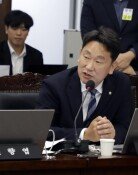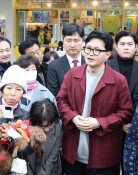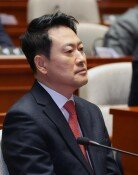Government Making All-out Effort to Restore Economy
Government Making All-out Effort to Restore Economy
Posted August. 12, 2004 21:56,
As the economic recession continues and the anxiety of the people continues to rise, the government and the ruling party are belatedly implementing measures to stimulate the economy by expanding fiscal expenditure, lowering the interest rate, and activating the real estate market.
Following the government and the Uri Partys decision to expand fiscal expenditure with the risk of running into debt, the Bank of Korea lowered the call rate with the risk of instable prices. The basis of policies regarding the real estate market has changed from restraining speculation to actively promoting trade and investment.
The government and the ruling party, who have kept saying that current economic conditions are not a crisis, have completely changed their position overnight. It can be deduced that the Roh administration has now admitted the current economic crisis.
Many experts are worried that although current conditions make short-term policies inevitable, it might bring side effects like the deterioration of sound finance and inflation.
Accordingly, it is pointed out that it is more urgent to fix fundamental problems like eliminating uncertainty in the market with consistent policies and settling the anxieties of investors.
The Monetary Policy Committee surprisingly lowering the call rate can be interpreted as a signal that the conditions of the domestic economy are not very favorable.
Park Seung, the governor of the Bank of Korea, stressed the necessity of reflation by saying, For the domestic economy, it is time to concentrate more on recovering from the recession than on prices. It is exceptional talk from the governor of the Bank of Korea since it is his job to stabilize prices.
Governor Park made it clear that the point of lowering the call rate is to restore the domestic economy and said, Although the decline in domestic demand stopped in June, the increased rate of exports has dropped and high oil prices have added to the burden. If it is left as it is, unfavorable conditions might continue until next year.
The Bank of Korea estimated that when the call rate is lowered by 0.25 percent, the loan rate defrayment of enterprises and households drops by 1.2 trillion won and 1.3 trillion won, respectively.
To recover from the economic recession, tax reduction policies are also brought up, as well as finance and monetary policies. Although the government isnt considering reducing the income tax and corporation tax, selective tax reductions, like temporary tax reductions on investments, are being considered.
In particular, the government has formed a real estate policy planning team under the Ministry of Finance and Economy, and given it full authority over policies related to real estate. Therefore, the basis of real estate policy has moved towards the market, and the baton has now been passed from the progressive Lee Jung-woo, chairman of the Presidential Commission on Policy Planning, to the pro-market Lee Hun-jae, vice minister of the Ministry of Finance and Economy.
Although the Roh administration was optimistic about the economy and insisted it would not use short-term reflation measures, they now admit their misjudgment.
Chairman Lee said in a session held in last June, The administration has chosen long-term procedures, considering developments in the long-term. Understand that there wont be temporary reflation measures.
The government and the ruling party completely changing their policies on economy seems to come from a change of their views on the current condition of the economy, and the Uri Partys consciousness of the fact that a groundless optimistic view on the economy was losing the support of the people.
Economic experts points out that although the governments strong will to restore the economy will improve the governments mindset on economic subjects, side effects like the deterioration of sound finance and inflation policies will occur.
The Korea Development Institute (KDI) presented in an economic policy session with the Uri Party on August 12 the proposal that fiscal expenditure should be minimized since large-scale reflation policies with the risk of inflation cannot be justified.
An anonymous official of a private economic research institute asserted, Lowering the interest rate will only instigate an increase in real estate prices, and it wont restore the economy at all. Consumption will further decrease due to the decline in interest income.
Therefore, there are voices saying that consistency of policies should be restored and uncertainty should be removed before practicing any reflation measures. Kim Yong-ha, professor at Soonchunhyang University, said, Attempting to restore the economy with temporary measures like tax reduction and the expansion of fiscal expenditures are undesirable. Fundamental measures to activate investments and to win confidence from economic subjects are needed.







